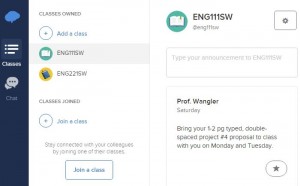“Use Remind,” they said, “your students will find it so convenient!”
“Remind is instant,” they said, “and all your students will see updates right away!”
“Remind is Safe,” they said, “nobody will be able to see or steal your students’ numbers and they won’t see yours!”
“You can schedule Remind Texts to go out over the course of the week and reach students on days off from class!”
Using Remind.com for announcements and little notes about homework for my English 111 class has been very convenient this semester. I’m fairly certain that most students see my announcements right away, as opposed to whenever they happen to log in to Moodle.
Despite my title, I do like this method of sending out announcements. I have been using texts with students for a few years now, in various forms. What I like about Remind is that it is safe, easy, and pretty much instantaneous if I need it to be. I often schedule all of my announcements at the beginning of each week, and then forget about them altogether, focusing my time on the course schedule and on responding to student work. The students who’ve signed up for my class on Remind seem to like getting the texts. I asked in class, and they said things like, “it makes my life a bit easier, since I know I’m going to get a reminder” and “I wish more of my teachers did this for me.” Generally, I think I’ve had a little bit better rate of homework completion from my one semester non-scientific sample study.
So why do I hate it? Because I do hate it. I think it reduces student accountability.
The biggest issue I’ve noticed is that my students rely on Remind as the sole way to remember to do homework. They seem not to check the class calendar or Moodle, because they expect to get a text from me. They seem less likely to write down assignments from the board because they expect to get a text from me. They seem not to closely read instruction sheets because they expect to get a text from me.
So, if this is true, if even one student is relying on the text messages to identify and help her/himself recall every assignment for my class… I have a problem with that. This usage of Remind is impossible to police–how would I require that students check a Google Doc schedule? That’s ludicrous. I can think of ways to compel them to do so, and even to test whether they did, but those are gimmicky and students will see right through that, and be annoyed. But I’m hesitant to use Remind again the way I did this semester, despite mostly positive feedback because I’ve come to the conclusion that if even one student relies solely on Remind, it puts all responsibility for my students’ outside of class work on me.
If even one student relies solely on Remind, it puts all responsibility for my students’ outside of class work on me.
My solution to this problem, however, is not to throw out Remind, despite the fact that I said I hated the tool. It’s a tool, and I can fix my biggest issue, a lack of student responsibility or accountability, with a really simple idea.
I’m going to put my students in charge of writing and scheduling the texts, and I’m going to make it part of their participation grade.
Each unit in my class, which is divided into four units, a different group will get a list of due dates and homework assignments from me, along with a password to the class Remind account. I’ll still monitor what they put in Remind, but as a low stakes group writing assignment, they’ll be tasked with writing the texts for the unit and with scheduling them at days and times that will best suit their peers. I’m hoping that by putting them in charge of their own reminders, they’ll be more invested in the schedule and in being sure they’re on track. I’ll reserve editorial rights, of course, but I am enthusiastic about the possibility for this to create a bit more engagement from the students regarding homework, our coursework, and the sequencing of assignments and assignment reminders.



Love it! Great idea, Sarah.